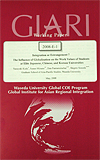GIARI全体 & 社会・文化領域
研究:出版物:Working Papers 2008年度(英語-27,日本語-4)
Integration or Estrangement ? The Influence of Globalization on the Work Values of Students at Elite Japanese, Chinese, and Korean Universities / Yasuyuki Kishi, Sunao Mizuno, Dan Pantumsinchai, Shigeto Sonoda
2008.05.30
概要
拠点メンバー、共同研究者、特別研究員、フェロー他、主に若手研究者の論文を対象にアジア地域統合に関する優れた論文を、ワーキングペーパーとして発刊する。言語は英語もしくは日本語。寄稿された論文は、編集委員会での審査を経て刊行される。刊行されたペーパーは、本学図書館をはじめ関連大学図書館、研究機関等に寄贈される。
GIARI Working Paper Vol. 2008-E-1
GIARI Working Paper Vol. 2008-E-1
Integration or Estrangement ?
The Influence of Globalization on the Work Values of Students
at Elite Japanese, Chinese, and Korean Universities
Yasuyuki Kishi*, Sunao Mizuno**, Dan Pantumsinchai***, Shigeto Sonoda****
Graduate School of Asia-Pacific Studies, Waseda University
May, 2008


* Research Associate, Waseda Institute for Asia-Pacific Studies, Waseda University
** MA Student, Graduate School of Asia-Pacific Studies, Waseda University
*** MA Student, Graduate School of Asia-Pacific Studies, Waseda University
**** Professor, Graduate School of Asia-Pacific Studies, Waseda University
Integration or Estrangement ?
The Influence of Globalization on the Work Values of Students
at Elite Japanese, Chinese, and Korean Universities
Yasuyuki Kishi*, Sunao Mizuno**, Dan Pantumsinchai***, Shigeto Sonoda****
Graduate School of Asia-Pacific Studies, Waseda University
May, 2008

* Research Associate, Waseda Institute for Asia-Pacific Studies, Waseda University
** MA Student, Graduate School of Asia-Pacific Studies, Waseda University
*** MA Student, Graduate School of Asia-Pacific Studies, Waseda University
**** Professor, Graduate School of Asia-Pacific Studies, Waseda University
Abstract
East Asia has been rapidly moving toward modernization, driven by the force of globalization. The result of that process is that country values are converging from traditional ones to modern ones. Countries have been congregating towards various ideologies, "meritocracy" in particular, as they continue to modernize.
This study aims to shed light on how globalization influences the work values of undergraduate students in Japan, China, and Korea. These three countries share a Confucian background which produces many interesting findings. Samples collected from Waseda, Fudan, and Korea Universities are examined using statistical analysis methods, and conclusions are drawn.
While work values are converging, they are not completely integrated. Each country still possesses its own unique set of characteristics that separate it from the other nations. However, Japanese and Korean students were found to possess similar work values when compared to Chinese students.
Interestingly, Chinese students have two conflicting ideologies: one of "egalitarian socialism" that places emphasis on the equality between people, and another of "modern meritocracy" that puts weight on individual development and reward.
How Chinese students will continue to reconcile this delicate balance as time goes by is a fascinating topic for future research.
Keywords: East Asia, globalization, modernization, work values, meritocracy, egalitarianism
This study aims to shed light on how globalization influences the work values of undergraduate students in Japan, China, and Korea. These three countries share a Confucian background which produces many interesting findings. Samples collected from Waseda, Fudan, and Korea Universities are examined using statistical analysis methods, and conclusions are drawn.
While work values are converging, they are not completely integrated. Each country still possesses its own unique set of characteristics that separate it from the other nations. However, Japanese and Korean students were found to possess similar work values when compared to Chinese students.
Interestingly, Chinese students have two conflicting ideologies: one of "egalitarian socialism" that places emphasis on the equality between people, and another of "modern meritocracy" that puts weight on individual development and reward.
How Chinese students will continue to reconcile this delicate balance as time goes by is a fascinating topic for future research.
Keywords: East Asia, globalization, modernization, work values, meritocracy, egalitarianism
Index
- Abstract
- 1. Introduction
- 2. Analytical Framework
- 3. Survey Outline
- 4. Differences between Japanese-Chinese-Korean Students’ Work Values
- 5. Results
- 6. Conclusion
- References
- [Appendix]